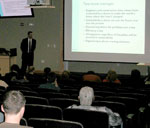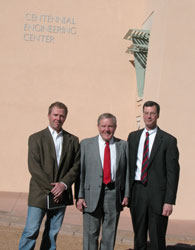Recent News
UNM Engineering team wins ASEE best paper for work on first-year engineering course
July 17, 2025
New director will enhance interdisciplinary engineering learning opportunities
July 2, 2025
Final SIRI cohort visits UNM campus
June 30, 2025
Perfetti receives ANS Landis Engineering Achievement Award
June 26, 2025
News Archives
High School Students Discover Engineering at UNM
March 4, 2011
 What does it take to be an engineer? Students at three Albuquerque high schools found out that it takes ingenuity, imagination, and problem-solving. “You don’t have to love math to be an engineer or constructor, just as gravediggers don’t have to love shovels,” says UNM Civil Associate Professor Kerry Howe. “Math is a tool engineers use to create solutions to global problems.”
What does it take to be an engineer? Students at three Albuquerque high schools found out that it takes ingenuity, imagination, and problem-solving. “You don’t have to love math to be an engineer or constructor, just as gravediggers don’t have to love shovels,” says UNM Civil Associate Professor Kerry Howe. “Math is a tool engineers use to create solutions to global problems.”
Howe talked to approximately 100 students from Rio Rancho High School, AIMS@UNM, and ACE Leadership High School about engineering, construction, and construction engineering. He discussed the exciting opportunities the next generation of engineers has in developing and refining new technologies while protecting our environment and resources. The third annual Bryant W. Lemon Sr. Distinguished Lecture was on Thursday, 2/24/11 and was part of the UNM School of Engineering celebration of National Engineers Week.
 Prior to the student activities, approximately 50 people attended an industry breakfast to listen to Dr. Howe give a presentation on "Designing and Building a Sustainable Future."
Prior to the student activities, approximately 50 people attended an industry breakfast to listen to Dr. Howe give a presentation on "Designing and Building a Sustainable Future."
Photo at right: Event sponsors Bill Lemon and Bryant W. Lemon, Sr. with Civil Engineering Professor Kerry Howe.
The students also participated in six activities to utilize the imagination and analytical skills of engineers and constructors:
1) K'nex Bridge - The students were divided into teams of 4 and given a set of K'nex. They were given 30 minutes to design a bridge that would span a piece of paper. The bridges were strength tested and the team with the strongest bridge won.
) Radioactive Ping Pong Balls - Students were divided into teams of 4. The teams were given a set of supplies, including straws, string, paper clips, and post it notes. The teams needed to move 5 ping pong balls from one paper bag to a paper bag 5 feet away.
3) Stream Table - The students got a tour of the hydraulics lab and a demonstration of some of the lab equipment such as the flume. They then got to work with a large stream model, learning about sources of pollution.
4) West Point Bridge Design - The students, in teams of 4, used the West Point Bridge Design Software to design and draw a bridge. The software allows the students to drive an animated truck over the bridge to test the strength.
5) Roof Insulation - Student teams were given a budget to buy different supplies to insulate a roof. The supplies included plastic bottles, aluminum foil, and fabric. The teams were given a box to simulate the roof, after 30 minutes the boxes were places under a heat lamp and the difference in temperate measured. The team with the best insulation won.
6) Construction Tour - The students were taken on a tour of the Castetter Hall construction site by project manager Pete Nieto, who talked about product choice and life cycle cost for the building.
